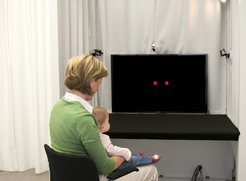Cognitive Development
In addition to our primary research program, we conduct studies investigating other areas of cognitive development in infancy. The goal of these studies is to investigate core aspects of the cognitive architecture infants use to make sense of their physical and social worlds and to test whether these foundational cognitive abilities persist from infancy into adulthood.

These projects examine whether cognitive and perceptual systems in infancy are sensitive to certain regularities in the world, such as the correlation between the pitch of sounds and the size of organisms making those sounds, and the constraints that Newtonian physics places on the movement of physical objects.
Additionally, we are observing how fundamental abilities such as the smooth and precise tracking of visual stimuli and visual information processing develop during infancy. Using eye tracking, we are exploring how infants categorize a variety of simple and complex visual stimuli based on their gaze behavior. The assessment of differences between infants and adults in their gaze behavior allows us to identify relevant cognitive mechanisms for these basic processes. These studies shed light on fundamental aspects of cognitive development across the lifespan and help to refine the methodological tools we use in our studies.
